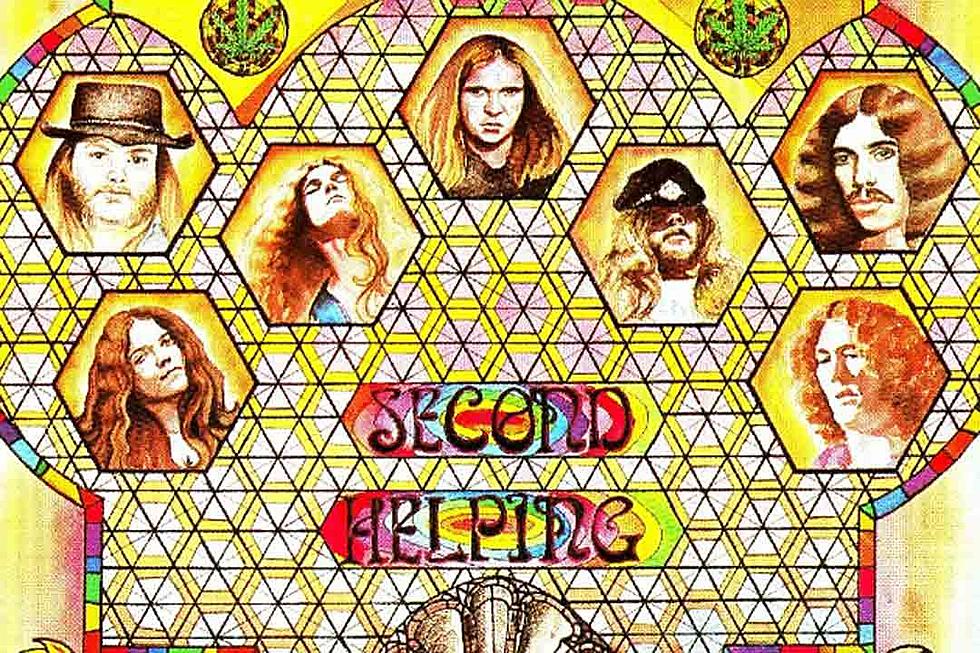
50 Years Ago: Lynyrd Skynyrd Keep Building With ‘Second Helping’
In the late summer of 1973, Lynyrd Skynyrd announced their arrival with their hit debut, Pronounced ‘Leh-’nerd ‘Skin-’nerd. Less than a year later, the band returned with an even bigger Second Helping.
Released on April 15, 1974, Helping reunited the group with producer and label boss Al Kooper, who'd signed them to his Sounds of the South imprint after catching a club performance and coming away stunned that they didn't have a record deal. Then, as now, one of the band's biggest selling points was its authenticity – particularly during a time when the music of the American South was being eagerly co-opted by a number of best-selling British bands.
"They're the real thing," Kooper told Disc and Music Echo in a 1974 interview. "The Rolling Stones can carry on and dance around and have Southern accents, but these are the real thing. These boys have a shack in the middle of the Florida swamps and in their spare time they chase alligators and go fishing for catfish."
READ MORE: Top 10 Gary Rossington Songs
Following the release of the first album, Kooper secured Skynyrd an opening slot on a tour with the Who, and although he later dismissed the notion that those shows helped break Skynyrd into the big leagues ("We only played a half-hour set and often people would arrive late for the show and miss them"), by the time they entered the studio to record Second Helping, they were already one of the bigger young rock bands on the market.
"We just went out with guns ablaze," keyboardist Billy Powell told Uncut. “We wanted to blow the doors off. In some places, Skynyrd went down better than the Who." Added guitarist Gary Rossington, "We were just a band that played clubs, teen dens and pubs. Then, all of a sudden, we were playing in stadiums for 30,000 people. ... We’d have shots of whiskey every night ’cause we were so scared."
None of those nerves came through on Second Helping, which included future fan favorites like "Don't Ask Me No Questions" and "The Ballad of Curtis Loew" as well as an outstanding cover of J.J. Cale's "Call Me the Breeze" – and, most importantly for the group's short-term chart prospects, one killer single: "Sweet Home Alabama."
Listen to Lynyrd Skynyrd's 'Sweet Home Alabama'
How 'Sweet Home Alabama' Changed Everything
Written as a tongue-in-cheek rejoinder to Neil Young's "Southern Man," Skynyrd's "Sweet Home Alabama" – which gave the band its first Top 10 hit in the summer of 1974 – bolstered its Dixie pride with a singalong chorus and an unforgettable riff. Although its success sparked rumors of bad blood between Young and the members of the group, lead singer Ronnie Van Zant insisted it was "more of a joke than anything else" and shrugged, "Hey, I love Neil Young. My wife plays his records around the house all the time. He even dug the song himself. He understood that we weren’t serious. You gotta write about something. It’s tough."
With "Sweet Home Alabama" climbing the charts, program directors returned to the band's debut, strengthening Skynyrd's grip on rock radio. "‘Sweet Home Alabama’ came out and all of a sudden people went, 'Oh, there’s a song called ‘Free Bird’ on Pronounced," current frontman Johnny Van Zant said during a 2012 UCR interview, with a laugh. "You know, back then rock radio played albums, so all of a sudden, boom, Second Helping, the whole album was being played on FM radio and then boom, they went back to Pronounced and it was being played on the radio."
Musically, Skynyrd's triple-guitar attack set them apart from other bands on the dial, while Ronnie Van Zant's lyrics touched on themes that resonated with the group's growing crowd of blue-collar (and/or redneck) fans. "Ronnie Van Zant was an out-and-out genius," guitarist Ed King later insisted, with Rossington nodding, "Ronnie could be very profound. He was all about the working-class man. He had a great way with a simple story."
READ MORE: Lynyrd Skynyrd Albums Ranked
Like the rest of the group, Van Zant also had a way with knocking back a few drinks, and then a few more. Even as early as Second Helping, Skynyrd had a reputation for being, as Van Zant later lamented, "a bunch of rowdy drunks."
It wasn't entirely undeserved. "Ronnie would give the shirt off his back for anyone," Powell told Uncut. "But he could also get pretty damn mean when he was drinking – the Jekyll & Hyde syndrome. I remember arguing with him once, after a few whiskeys, about Allen Collins’ volume and tuning up onstage. Next thing I know, I got my teeth knocked out. That’s how he led the band. But at the same time, if there was trouble from outside, he’d fight for us. He went to jail for us a few times. And when it came down to business, he was always right. We could always trust him."
Listen to Lynyrd Skynyrd's 'Don't Ask Me No Questions'
Why Lynyrd Skynyrd Resonated Back Then
That uncompromising style was great for business, but it took its toll. "I can see an end to Lynyrd Skynyrd," Van Zant admitted in a 1976 interview with Creem. "I know I won't be doing this forever. I can't keep on screaming like this much longer. I've been doing it for almost 10 years, and my body can't take abuse much longer. It's scary to me because this is the way I make my living and it's destroying my body. I can't sing as strong as I used to – it's a bad combination of whiskey and 'playing' Lynyrd Skynyrd. You can't keep up in a style like mine."
Sadly, he'd never have a chance to find out just how long he'd be able to keep up. On Oct. 20, 1977, shortly after the release of the band's fifth studio LP, Street Survivors, Skynyrd's chartered plane crashed, killing the pilot, co-pilot, the group's assistant road manager, and three band members: Van Zant, guitarist Steve Gaines, and Gaines' sister Cassie, a backup singer. The band reunited years later with a new lineup then continued to tour and record, but those early albums enjoyed an exalted status that subsequent efforts were never really able to attain.
"In those days, it was the Alice Coopers and Kisses and all the makeup," Rossington once mused when asked to explain the source of Skynyrd's early appeal. "That’s who was making it. We were kinda real. We wore blue jeans and T-shirts. Our music was our gimmick."
That's something Kooper understood from the very beginning. "Skynyrd don't do any tricks onstage. They just get up there and play better than most people do," he told Disc and Music Echo. "That they don't leap about and do any tricks has been the major criticism leveled against them, but they're very serious about what they're doing, and they're not wrong. If you want to hear music, that's the place to go to, and if you want to see a show, you should stay home."
Legends Who Never Had a No. 1 Single
Gallery Credit: Nick DeRiso
You Think You Know Lynyrd Skynyrd?
More From WWMJ Ellsworth Maine










